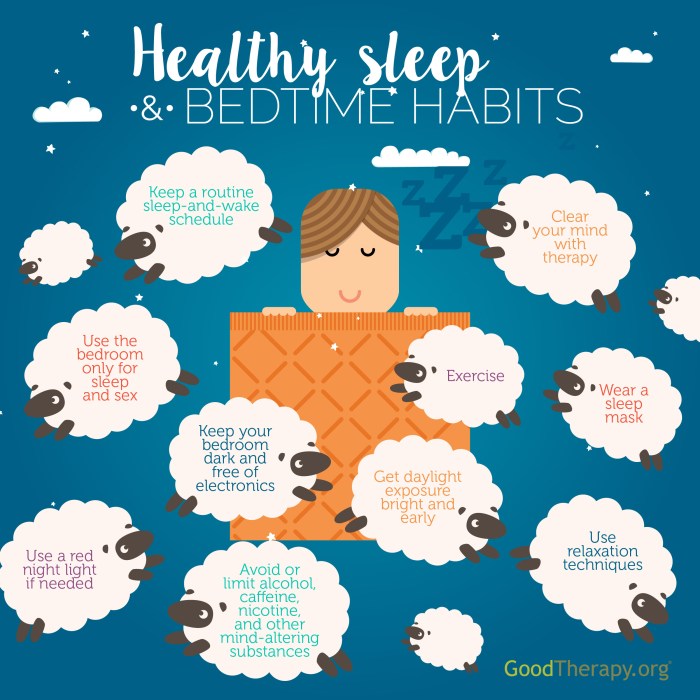Sleep hygiene is crucial for your overall well-being, impacting both your mental and physical health. Let’s dive into how simple habits can transform your sleep quality and daily productivity.
Are you ready to unlock the secrets to a good night’s sleep?
Importance of Sleep Hygiene
Having good sleep hygiene is crucial for your overall well-being. It involves establishing healthy habits and routines that promote quality sleep, which is essential for optimal physical and mental health.
Poor sleep hygiene can have a significant impact on your mental and physical health. It can lead to fatigue, irritability, difficulty concentrating, and even increased risk of developing chronic conditions like obesity, diabetes, and heart disease. Additionally, inadequate sleep can impair your immune system, making you more susceptible to illnesses.
Benefits of Good Sleep Hygiene
- Improved focus and concentration: Getting enough quality sleep can enhance cognitive function, helping you stay alert and focused throughout the day.
- Enhanced mood: Proper sleep hygiene can contribute to better emotional regulation, reducing the risk of mood disorders like anxiety and depression.
- Increased productivity: When you are well-rested, you are more efficient in completing tasks and achieving your goals.
- Boosted immune system: Quality sleep strengthens your immune system, making it easier for your body to fight off infections and illnesses.
Creating a Sleep-Inducing Environment
Creating the right sleep environment is crucial for getting a good night’s rest. Your bedroom setup plays a significant role in promoting healthy sleep habits and ensuring you wake up feeling refreshed and rejuvenated.
Ideal Bedroom Setup
- Keep your bedroom cool: Lower temperatures signal to your body that it’s time to sleep, so aim for a room temperature between 60-67°F.
- Make it dark: Invest in blackout curtains or an eye mask to block out any unwanted light that can disturb your sleep.
- Reduce noise: Use earplugs or a white noise machine to mask any disruptive sounds that may prevent you from falling asleep or wake you up during the night.
Comfortable Bedding and Pillows
- Choose the right mattress: Your mattress should provide adequate support for your body to prevent aches and pains that could disrupt your sleep.
- Select quality pillows: Pillows that properly support your head and neck can help you maintain a comfortable sleeping position throughout the night.
- Use breathable bedding: Opt for sheets and blankets made from natural materials like cotton to help regulate your body temperature and prevent overheating.
Establishing a Bedtime Routine
Having a consistent bedtime routine can greatly benefit your sleep quality and overall health. It helps regulate your internal body clock, making it easier to fall asleep and wake up at the same time every day. This consistency can improve the quality of your sleep, leaving you feeling more refreshed and energized in the morning.
Calming Activities for Bedtime
- Reading a book: Engaging in a relaxing activity like reading can help calm the mind and signal to your body that it’s time to wind down.
- Listening to calming music or white noise: Soft sounds can create a soothing environment conducive to sleep.
- Practicing deep breathing or meditation: These techniques can help reduce stress and anxiety, promoting relaxation before bedtime.
- Taking a warm bath: A warm bath can relax your muscles and prepare your body for sleep.
Avoiding Stimulating Activities
Engaging in stimulating activities before bedtime can disrupt your sleep cycle and make it harder to fall asleep. Avoid activities like watching TV, using electronic devices, or intense exercise close to bedtime. These activities can increase alertness and make it difficult for your body to relax and transition into sleep mode. It’s important to create a calming bedtime routine to help your body unwind and prepare for a restful night’s sleep.
Managing Electronic Devices

In today’s digital age, electronic devices have become an integral part of our daily lives. However, the excessive use of screens before bedtime can have a detrimental impact on the quality of our sleep.
Exposure to the blue light emitted by screens can disrupt our circadian rhythm, making it harder to fall asleep. The stimulation from engaging with content on electronic devices can also keep our brains active, making it difficult to wind down and relax before bed.
Reducing Screen Time Before Bed
- Avoid using electronic devices at least an hour before bedtime to allow your brain to unwind and prepare for sleep.
- Use blue light filters or apps that adjust the screen’s color temperature to reduce the impact of blue light on your sleep cycle.
- Set a specific time to power down all devices and engage in calming activities like reading a book or practicing relaxation techniques.
Benefits of Screen-Free Activities
- Engaging in screen-free activities can help signal to your brain that it’s time to wind down and prepare for sleep.
- Activities like reading, journaling, or listening to calming music can promote relaxation and reduce stress levels, making it easier to fall asleep.
- Screen-free activities can also improve the quality of your sleep by reducing the impact of blue light and mental stimulation before bedtime.
Nutrition and Sleep Quality: Sleep Hygiene

Maintaining a healthy diet plays a crucial role in promoting good sleep hygiene. The foods we consume can either help or hinder our ability to get a restful night’s sleep.
Impact of Caffeine and Heavy Meals, Sleep hygiene
- Avoid consuming caffeine close to bedtime as it can interfere with your ability to fall asleep. Opt for decaffeinated beverages in the afternoon and evening.
- Avoid heavy meals right before bedtime as they can cause indigestion and discomfort, making it harder to relax and fall asleep.
- Consider having a light snack if you’re hungry before bed, but choose foods that are easy to digest and won’t cause discomfort.
Choosing Sleep-Friendly Foods
- Include foods rich in tryptophan, magnesium, and melatonin in your evening meals. These nutrients can promote relaxation and help regulate your sleep-wake cycle.
- Opt for complex carbohydrates like whole grains, fruits, and vegetables, as they can help promote the production of serotonin, a neurotransmitter that aids in sleep.
- Limit sugar and processed foods, as they can cause fluctuations in blood sugar levels and disrupt your sleep patterns.
- Stay hydrated throughout the day, but avoid excessive fluid intake close to bedtime to prevent frequent trips to the bathroom during the night.
Exercise and Sleep
Regular physical activity can have a significant impact on the quality of your sleep. When you engage in exercise, it can help you fall asleep faster and enjoy deeper sleep throughout the night. However, the timing and type of exercise are crucial in maximizing the benefits for your sleep hygiene.
Optimal Timing for Exercise
Exercising earlier in the day, preferably in the morning or afternoon, can be more beneficial for improving sleep quality. Avoid vigorous exercise close to bedtime, as it may increase alertness and make it harder for you to unwind and fall asleep.
Suitable Exercises for Better Sleep
- Cardiovascular exercises like running, cycling, or swimming can help regulate your sleep patterns and improve overall sleep quality.
- Yoga and stretching exercises can help relax both your body and mind, reducing stress and promoting better sleep.
- Strength training exercises, when done earlier in the day, can also contribute to better sleep by increasing the amount of deep sleep you get at night.
